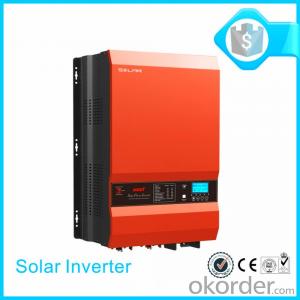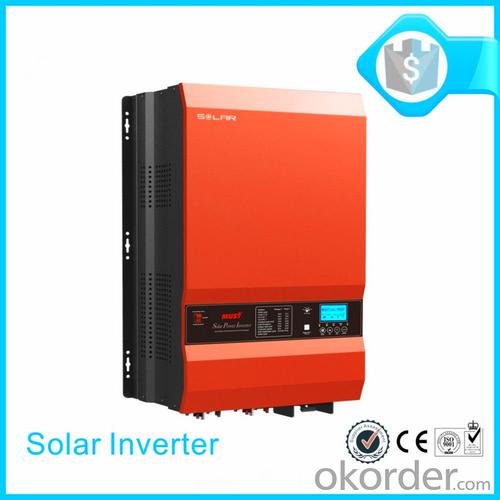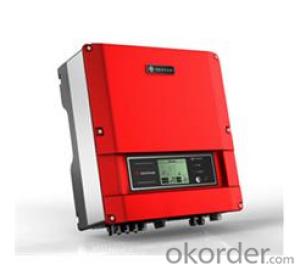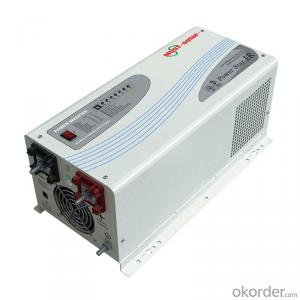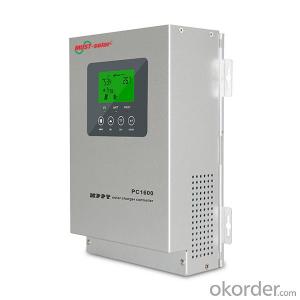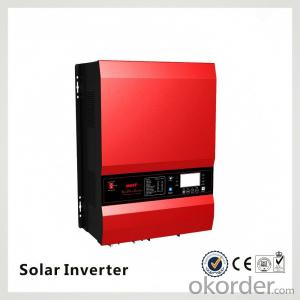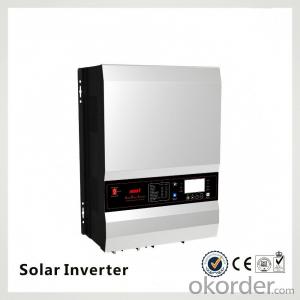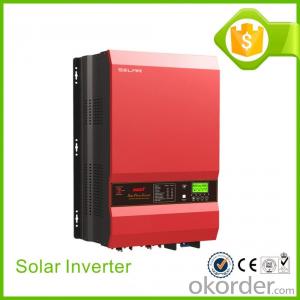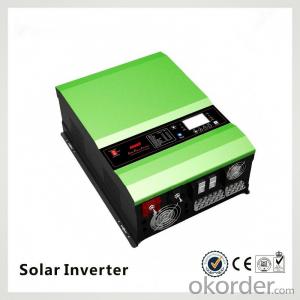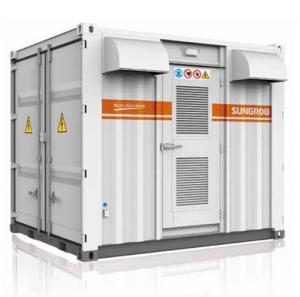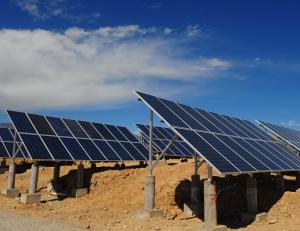Sungrow Solar Inverter 2400 Watt Off-Grid Hybrid Solar Power Inverter 1000 2000 3000 4000 5000VA
- Loading Port:
- Shanghai
- Payment Terms:
- TT OR LC
- Min Order Qty:
- 10000 watt
- Supply Capability:
- 100000 watt/month
OKorder Service Pledge
OKorder Financial Service
You Might Also Like
Product Description
What is Solar inverter?
Solar pv inverters is an electronic system that operates the photovoltaic(PV) modules in a manner that allows the modules to produce all the power they are capable of. The solar mate charge controller is a microprocessor-based system designed to implement the MPPT. It can increase charge current up to 30% or more compared to traditional charge controllers.
Features
. Pure sine wave inverter
. Selectable input voltage range for home appliances and personal computers
. Selectable charging current based on applications
. Configurable AC/Solar input priority via LCD setting
. Compatible to mains voltage or generator power
. Parallel operation with up to 6 units only available for PV1800 4KVA/5KVA
. Auto restart while AC is recovering
. Overload and short circuit protection
. Smart battery charger design for optimized battery performance
. Cold start function
Specification
RATED POWER | 1000VA / 800W | 2000VA/ | 3000VA / 2400W | 4000VA / 3200W | 5000VA / 4000W | |||||
INPUT | ||||||||||
Voltage | 230 VAC | |||||||||
Selectable Voltage Range | 170-280 VAC (For Personal Computers) ; 90-280 VAC (For Home Appliances) | |||||||||
Frequency Range | 50 Hz/60 Hz (Auto sensing) | |||||||||
OUTPUT | ||||||||||
AC Voltage Regulation | 230 VAC ± 5% | |||||||||
Surge Power | 2000VA | 4000VA | 6000VA | 8000VA | 10000VA | |||||
Efficiency (Peak) | 90% | 93% | ||||||||
Transfer Time | 10 ms (For Personal Computers) ; 20 ms (For Home Appliances) | |||||||||
Waveform | Pure sine wave | |||||||||
BATTERY | ||||||||||
Battery Voltage | 12 VDC | 24 VDC | 48 VDC | |||||||
Floating Charge Voltage | 13.5 VDC | 27 VDC | 54 VDC | |||||||
Overcharge Protection | 15 VDC | 30 VDC | 60 VDC | |||||||
Maximum Charge Current | 10 A or 20 A | 20 A or 30 A | 60 A | |||||||
SOLAR CHARGER (OPTION) | ||||||||||
Charging Current | 50 A | |||||||||
Maximum PV Array Open Circuit Voltage | 30 VDC | 60 VDC | 105 VDC | |||||||
Standby power Consumption | 1 W | 2 W | 2 W | |||||||
PHYSICAL | ||||||||||
Dimension, D x W x H (mm) | 95 x 240 x 316 | 100 x 272 x 355 | 125 x 297.5 x 468 | |||||||
Net Weight (kgs) | 5.0 | 6.4 | 6.9 | 9.8 | 9.8 | |||||
OPERATING ENVIRONMENT | ||||||||||
Humidity | 5% to 95% Relative Humidity(Non-condensing) | |||||||||
Operating Temperature | 0°C - 55°C | |||||||||
Storage Temperature | -15°C - 60°C | |||||||||
Images
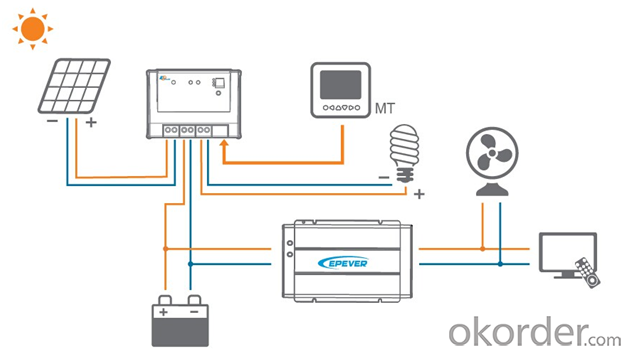
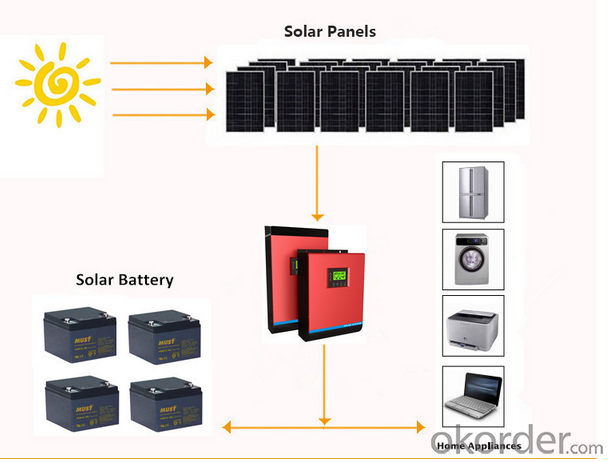
Packaging & Shipping
What is the packing?
1.Package: Carton Box for packaging, or Wooden Box advised for Samples to protect in transportations. Package designed by Clients is welcomed.
2.Shipping: DHL,FEDEX,UPS,EMS,AirWay and By Sea.
3.Payment: T/T( telegraphic transfer (T/T) and Western Union
4.Welcome to your Sample Order to test First.
FAQ
Q1: How to choose a right inverter?
A1:Tell us your demand, then our sales will recommend a suitable inverter to you.
Q2: What's the different between inverter and solar inverter?
A2: Inverter is only accept AC input, but solar inverter not only accept AC input but also can connect with solar panel to accept PV input, it more save power.
Q3: How about the delivery time?
A3: 7 days for sample; 25 days for bulk order.
- Q: After the PV inverter, how to achieve the same period before the network?
- When the voltage, frequency, phase does not meet the requirements, the automatic closing closing pulse.
- Q: How does a solar inverter handle voltage regulation during load changes?
- A solar inverter handles voltage regulation during load changes by continuously monitoring the output voltage and adjusting its operation accordingly. When there is a sudden increase or decrease in load, the inverter's control system quickly responds by either increasing or decreasing the amount of power it draws from the solar panels. This ensures that the voltage remains stable and within the desired range, minimizing the impact of load changes on the system.
- Q: What are the safety considerations when installing a solar inverter?
- When installing a solar inverter, there are several important safety considerations to keep in mind. Firstly, it is crucial to ensure that the power supply to the inverter is completely disconnected before beginning the installation process. This helps to prevent any electrical shocks or accidents. Additionally, it is important to follow the manufacturer's instructions and guidelines precisely to ensure a safe installation. Another key safety consideration is to make sure that the inverter is properly grounded to prevent the risk of electrical faults or fires. Finally, it is advisable to work with a qualified and experienced electrician to ensure that the installation is done correctly and in compliance with local electrical codes and regulations.
- Q: What is the maximum output power of a solar inverter?
- The maximum output power of a solar inverter varies depending on the specific model and its capacity. However, typical residential solar inverters have a maximum output power ranging from 1 kilowatt (kW) to 10 kW, while commercial and utility-scale solar inverters can have maximum output powers exceeding several megawatts (MW).
- Q: What is the lifespan of the warranty on a solar inverter?
- The lifespan of a warranty on a solar inverter can vary depending on the manufacturer and the specific model. However, most warranties typically range from 5 to 10 years, with some higher-end inverters offering warranties up to 25 years. It is important to carefully review the warranty terms and conditions provided by the manufacturer to understand the coverage and duration of the warranty.
- Q: What is the role of voltage support in a solar inverter?
- The role of voltage support in a solar inverter is to ensure that the output voltage from the inverter remains stable and within acceptable limits. It helps regulate the voltage to match the requirements of the connected load, preventing any voltage fluctuations or overvoltage conditions that could potentially damage the equipment or disrupt the operation of the solar power system.
- Q: What is the role of a solar inverter in protecting the electrical grid?
- The role of a solar inverter in protecting the electrical grid is to efficiently convert the direct current (DC) generated by solar panels into alternating current (AC) that can be safely integrated and synchronized with the existing grid. This helps ensure the stability, reliability, and quality of the electricity being fed into the grid, preventing any potential disruptions or damages that could occur due to inconsistent or incompatible power inputs. Additionally, solar inverters also play a crucial role in monitoring and controlling the energy flow, protecting against grid faults, and providing necessary safety features like voltage regulation and anti-islanding to safeguard both the grid and the solar installation.
- Q: How does a hybrid solar inverter work?
- A hybrid solar inverter works by converting the direct current (DC) electricity generated by solar panels into alternating current (AC) electricity that can be used to power appliances and equipment in a home or business. It also has the ability to store excess electricity in batteries for later use. Additionally, it can draw electricity from the grid when solar power is not sufficient, ensuring a continuous power supply. Overall, a hybrid solar inverter maximizes the use of solar energy and provides flexibility in managing electricity consumption.
- Q: What is the maximum voltage input for a solar inverter?
- The maximum voltage input for a solar inverter typically depends on the specific model and manufacturer. However, in general, most solar inverters have a maximum voltage input ranging from 600V to 1000V.
- Q: Can a solar inverter be used with different types of energy management systems?
- Yes, a solar inverter can be used with different types of energy management systems. Solar inverters are designed to convert the direct current (DC) produced by solar panels into alternating current (AC) that can be used in various electrical systems. They can be integrated with different energy management systems, such as battery storage systems, smart grids, or even hybrid systems that combine solar power with other renewable energy sources. This flexibility allows for efficient and optimized utilization of solar energy in different setups and applications.
Send your message to us
Sungrow Solar Inverter 2400 Watt Off-Grid Hybrid Solar Power Inverter 1000 2000 3000 4000 5000VA
- Loading Port:
- Shanghai
- Payment Terms:
- TT OR LC
- Min Order Qty:
- 10000 watt
- Supply Capability:
- 100000 watt/month
OKorder Service Pledge
OKorder Financial Service
Similar products
Hot products
Hot Searches
Related keywords
